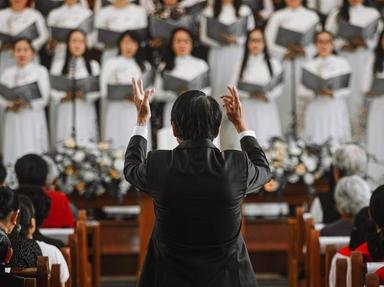Quiz Answer Key and Fun Facts
1. Septimus Winner (1827-1902) was a well known poet, composer and violinist who wrote the highly popular song 'Listen to the Mocking Bird'. He also wrote the hymn 'Whispering Hope' in 1868. Out of the list below, what is the only event that happened in 1868?
2. John Greenleaf Whittier was a politician, editor and a vehement opponent of slavery who wrote the hymn 'Thine Are All the Gifts, O God' in 1878. Who were the president of the United States and the monarch of Great Britain in 1878?
3. Alfred Lord Tennyson (1809-1892) was one of the best known English poets of the 19th Century. However, he also wrote three hymns, including 'Ring Out the Old, Ring in the New'. The hymn was written eleven years before the start of the U.S. Civil War. In what year did he write the hymn?
4. The man who wrote novels such as 'Ivanhoe', 'Rob Roy', 'The Bride of Lammermoor" and 'The Heart of Midlothian' also wrote the hymn 'When Israel, of the Lord Beloved' in 1817. What is the man's name?
5. Timothy Dwight (1752-1817) was a personal friend of George Washington and served as president of Yale University for twenty-two years. He is also credited with writing five hymns, including 'In Zion's Sacred Gates' in 1800. Out of the four events below, what is the only one that happened in 1800?
6. "How do I love thee? Let me count the ways" is the first line of a poem by a famous English poet who is also credited with writing five hymns, including 'The Little Cares Which Fretted Me'. What is the name of the poet?
7. Anne Bronte (1820-1849) was one of the famous Bronte sisters, perhaps the best known literary family in the world at the time. In addition to producing works like 'Agnes Grey' in 1847, she is credited with writing at least seven hymns, including 'Eternal Power, of Earth and Air!' What were the first names of Anne Bronte's two literary sisters?
8. John Bowring (1792-1872) wrote the words to the famous hymn 'In the Cross of Christ I Glory' as well as more than twenty other hymns. He was an accomplished linguist with a number of lofty achievements in the secular world. Out of the four achievements listed below, which one is NOT part of his resume?
9. Katharine Lee Bates was a professor of English at Wellesley College in Wellesley, Massachusetts, and after retirement she became professor emeritus. Bates, who is credited with writing four hymns including 'Dear God, Our Father', died in 1929. Out of the four events below, which one did not take place in 1929?
10. Sabine Baring-Gould (1834-1924) wrote more than one hundred books and was an archaeologist, architect, artist, teacher and a collector of English folk songs. However, in some circles, he is most famous for writing a hymn that is often associated with outdoor concerts and crusades conducted by the Salvation Army. What is the hymn?
Source: Author
Cowrofl
This quiz was reviewed by FunTrivia editor
agony before going online.
Any errors found in FunTrivia content are routinely corrected through our feedback system.
